- VS Gaitonde
- Ram Kumar
- Akbar Padamsee
- Amrita Sher-Gil
- Vanita Gupta
- Smita Kinkale
- Ratnadeep Adivrekar
- Tathi Premchand
- Nilesh Kinkale
- Prabhakar Kolte
- Chintan Upadhyay
- Prabhakar Barwe
- Shankar Palsikar
- Yashwant Deshmukh
- Prabhakar Kolte
- Sanchita Sharma
- Prakash Waghmare
- Ranjit Hoskote
- Premjish Achari
- Pankaja JK
- Contact
Friday, 27 September 2024
Chromatic Rhapsody - Ranadip Mukherjee
Thursday, 26 September 2024
India Art Fair to Launch in Mumbai Next Year
Monday, 23 September 2024
AstaGuru Offers A Unique Selection of Modern and Contemporary Indian Artworks in its Upcoming ‘Manifest’ Auction
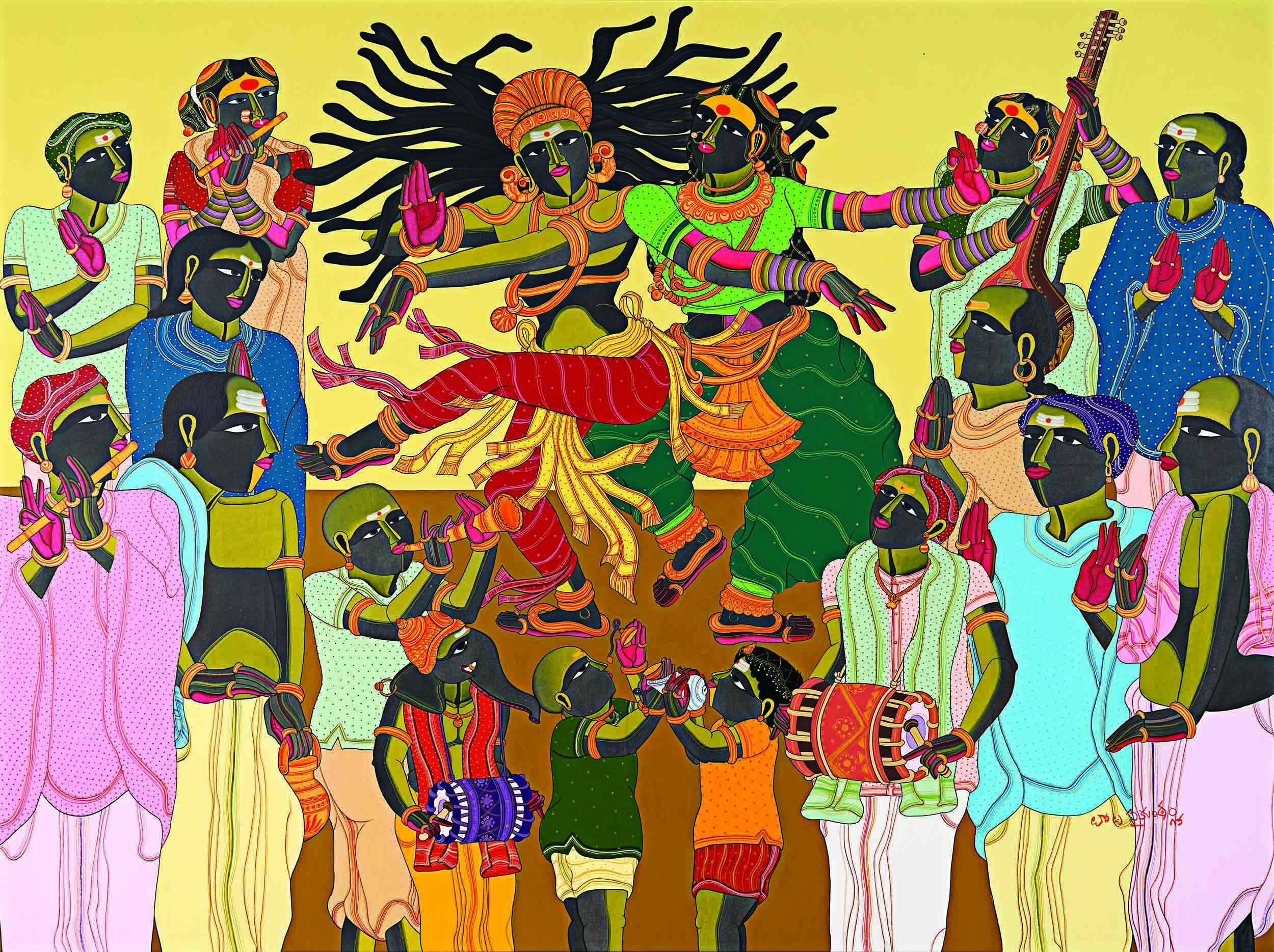
AstaGuru’s upcoming auction, titled ‘Manifest,’ will showcase a unique amalgamation of modern and contemporary Indian art from the oeuvres of the most celebrated artists in the country. The meticulously curated catalogue highlights rare works by eminent modern Indian artists including M F Husain, Amrita Sher-Gil, Bikash Bhattacharjee, Jamini Roy, K K Hebbar, K H Ara, Jogen Chowdhury, K G Subramanyan, S H Raza, Akbar Padamsee, Manjit Bawa and T Vaikuntam. Among the vast selection of contemporary Indian artists showcased are Jagannath Panda, Ravinder Reddy, Surendran Nair, Jitish Kallat, Ranbir Singh K aleka, Nikhil Chaganlal, Meetali Singh and Mousumi Biswas. The auction will be held on September 24-26, 2024.
Sneha Gautam, Senior Vice President, Client Relations, AstaGuru Auction House says, “
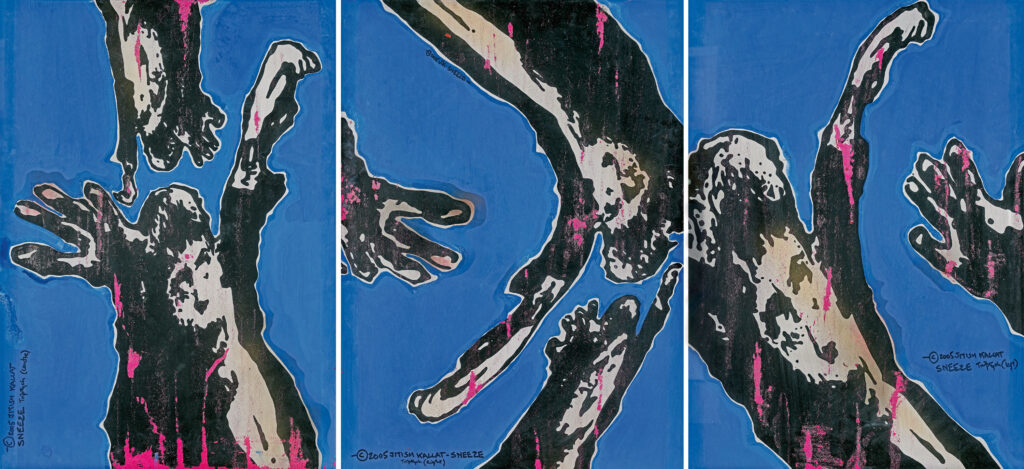
“We are absolutely thrilled to present ‘Manifest,’ a meticulously curated auction that brings together the finest modern and contemporary Indian art under one roof. This catalogue offers collectors a rare opportunity to acquire works that span generations, styles, and periods, featuring icons such as M F Husain, Amrita Sher-Gil, and Jamini Roy, alongside leading contemporary voices like Jagannath Panda and Jitish Kallat. We have taken an approach to ensure a harmonious balance between the genres, offering something exceptional for every collector’s unique taste. The curation of ‘Manifest’ reflects our commitment to providing a comprehensive, yet thoughtfully balanced selection, to make sure clientele can find pieces that resonate with them, while also exploring the breadth of Indian art history.”

Leading the auction is Lot no. 73, an untitled work by M F Husain executed circa 1960s in oil on canvas. The work originally belonged to the famed Chester and Davida Herwitz collection, often cited as one of the most comprehensive amalgamations of modern and contemporary Indian art in the world. In the presented lot, Husain presents three figures with obscured faces, a recurring theme in his art. The lot will be offered at an estimate of INR 3,50,00,000 – 5,00,00,000.
Another impactful work by Husain, lot no. 173, will also be showcased in the upcoming auction. Untitled (Yellow Strip Of Metaphor) is an oil on canvas work executed in 1967. Husain’s artistic journey during the 1960s was marked by a clear thematic progression. His paintings boldly challenged societal norms, exploring themes of passion and desire. The lot is estimated at INR 3,00,00,000 – 4,00,00,000
S H Raza’s ‘Kundalini’, lot no. 86, is an acrylic on canvas work executed in 1999. Created in his signature style, the work comes from his vast oeuvre of geometric works in vibrant colours. The Kundalini represents the ultimate source of energy and is usually depicted in the form of a coiled serpent. This lot will be offered at an estimate of INR 1,80,00,000 – 2,80,00,000.
Lot no. 197, an untitled large-scale work by K K Hebbar is estimated to be acquired at INR 1,00,00,000 – 1,50,00,000. The mixed media on board work was executed in 1968 and reflects the artist’s enduring interest in the folk traditions, geography and fauna of India.
Thota Vaikuntam’s untitled work, lot no. 234 is an acrylic on canvas work executed in 2017. Vaikuntam’s oeuvre consists of paintings that encapsulate the everyday life of the rural folk of Telangana, their culture and the mythology associated with it. The work is estimated at INR 80,00,000 – 1,20,00,000.

An untitled work by Manjit Bawa, lot no. 170, is estimated to be sold for INR 3,00,00,000 – 4,00,00,000. Executed in 1988, the oil on canvas work is evidence of Bawa’s inspiration from Indian classical artistic traditions, skillfully blending elements from various genres and periods into his work. His mastery of colour and space results in captivating compositions like the presented lot.
Contemporary Highlights to Look Out For:
The ‘Manifest’ auction also features notable contemporary works, such as Jagannath Panda’s Again & Again II (Lot no. 186), a mixed media piece reflecting on urbanization and tradition, estimated at INR 50 to 70 lakh, and Jitish Kallat’s Sneeze (Triptych) (Lot no. 64), a thought-provoking commentary on human vulnerability, estimated at INR 90 lakh to 1.5 crore.
For more information, log on to www.astaguru.com
About AstaGuru
AstaGuru Auction House was conceptualised in the year 2008 with the sole purpose of creating a safe and secure platform to conduct online auctions for Contemporary & Modern Indian Art. Over the years, AstaGuru has curated auctions encompassing diverse categories, our portfolio includes art, jewellery, fine silver, timepieces, textiles, celebrity memorabilia, rare books, numismatic, philately and vintage cars. In 2018, AstaGuru became the first Indian auction house to present an exclusive edition for vintage and classic cars. “AstaGuru has strived to successfully bridge the gap between prospective buyers and consignors by transcending the limitations of live auctions. AstaGuru imparts effortless transparency to the process of acquiring and selling art and rare collectibles. The online module offers bidders the opportunity to bid from the comfort of their houses or while they are on the go.
For more information, please log on to https://www.astaguru.com/
Facebook: @Astaguru | Instagram: @astaguru | X: @astagurutweets
K Laxma Goud: Life & Artistic Explorations
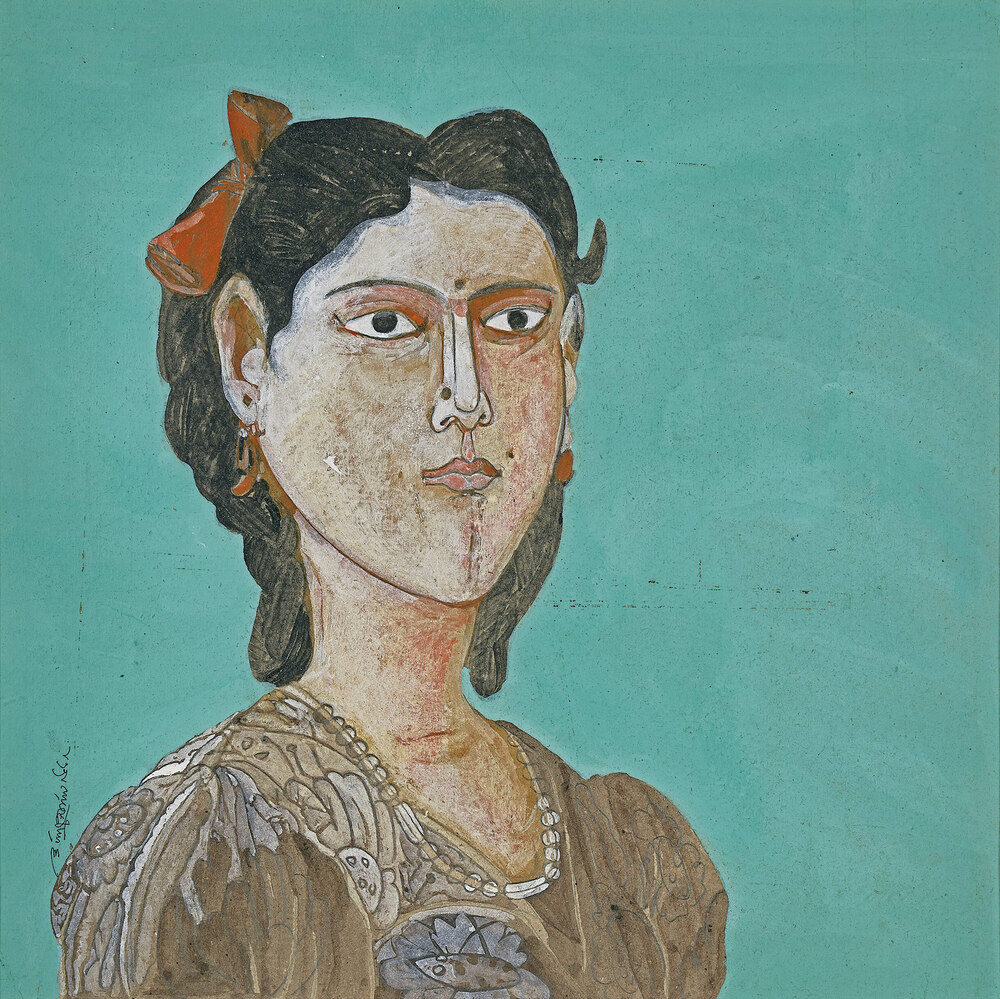
21st August marks the 84th birthday of K. Laxma Goud. Born in 1940, in the state of Telangana, Goud is a prolific Indian painter, celebrated for his distinctive style that blends traditional Indian themes with modern artistic sensibilities. He studied at the Government College of Fine Arts and Architecture in Hyderabad and later at the Faculty of Fine Arts, MS University, Baroda under the guidance of K.G. Subramanyan from 1963 to 1965.
Through his works, he often explored themes related to rural life, folk traditions, and the human form. His art is notable for its use of bold lines, vibrant colours, and an expressive portrayal of emotions and daily tribal life. He employs various media, including drawing, painting, and printmaking, and is known for his mastery of the medium of etching.
Laxma Goud is popularly known for his early erotic works that often merged traditional Indian motifs with a modernist approach, creating a visual dialogue between the ancient and the contemporary. His pieces captured the essence and subtleties of intimacy and sensuality without making it look crude or indelicate. This approach was a subject of both admiration and controversy, as it challenged the conventional boundaries and engaged with themes that were sometimes considered taboo in traditional contexts. The artist’s ability to provoke thought and emotion through his creative expression is a testament to his brilliant skill in navigating complex themes.
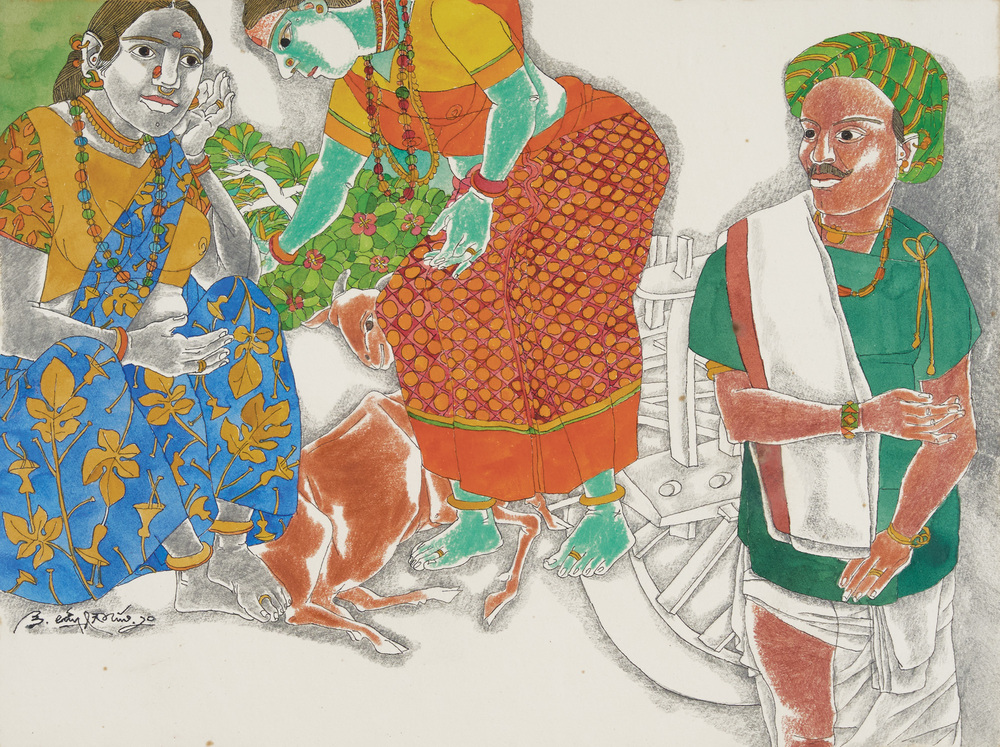
Goud frequently incorporated figures from Hindu mythology such as deities and mythical beings, into his work. His depictions of Gods and Goddesses created utilising traditional iconography with a contemporary aesthetic, highlighted the timeless relevance of these mythological themes. Goud’s work also included elements of nature, such as flora and fauna, which may be seen as an extension of the divine or a reflection of mythological landscapes.
K. Laxma Goud was well-known for his distinctive portraits that often captured the essence of his subjects with remarkable detail and emotion. His portraits of individuals captured a range of emotions and expressions, highlighting the personal and collective experiences of the people he portrayed. His portraits also often reflected a deep personal connection with his subjects. The artist’s understanding of empathy is evident in the way he represented their expressions and details, providing a nuanced portrayal of their inner lives.
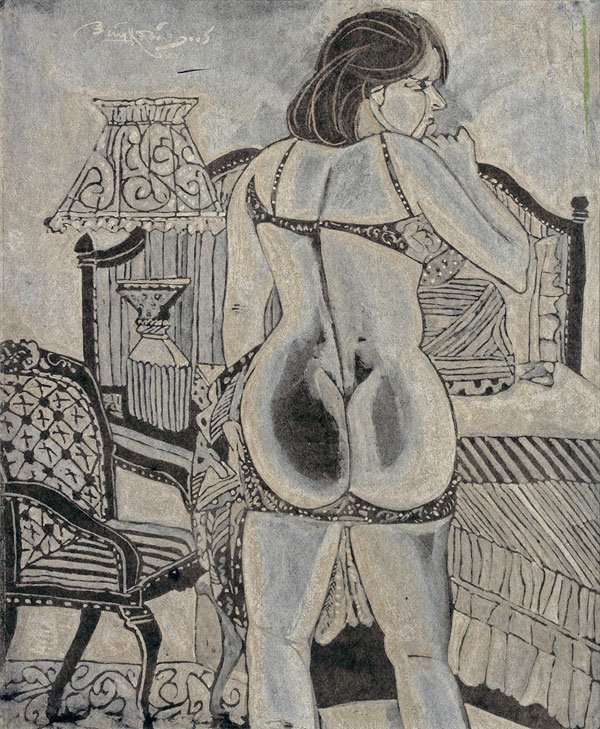
The artist is recognised for capturing the essence of the cultural and social aspects of tribal communities by blending realism and abstraction styles. He frequently depicted scenes from the everyday lives of tribal people, including domestic activities, rituals, and social gatherings. His artwork provided a window into the traditional practices and communal activities that defined tribal life. Goud’s paintings and drawings also featured traditional tribal attire, jewellery, and artefacts, capturing the distinctive cultural expressions of tribal communities. These elements served as symbols of identity and heritage.
The artist has showcased his works in both India and abroad. He has received numerous awards and accolades for his work, including fellowships and grants that recognise his contribution to the arts. His work is part of major art collections and continues to influence emerging artists in India. K Laxma Goud’s legacy is marked by his distinctive style and contributions to modern Indian art.Authored by Sunny Chandiramani, Senior Vice President at AstaGuru Auction House.



